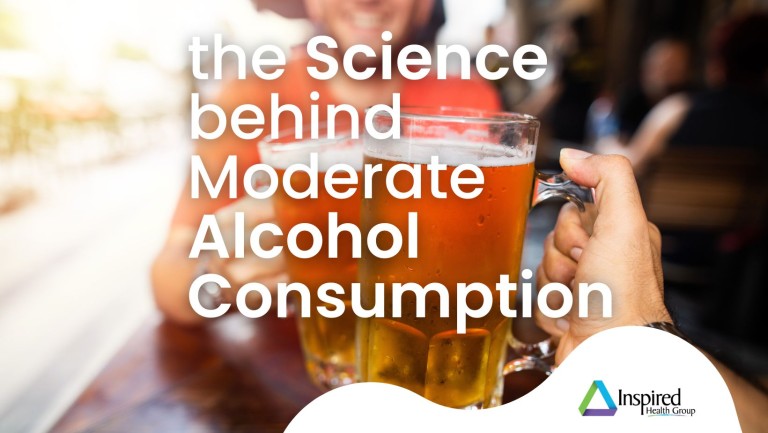In honor of Alcohol Awareness Month, we're taking a look at science behind the moderate consumption of alcohol to help our patients make informed decisions with the most up-to-date information available.
What are the current consumption guidelines?
The Dietary Guidelines for Americans provides advice on what to eat and drink to meet nutrient needs, promote health, and help prevent chronic disease from U.S. Department of Agriculture in cooperation with U.S. Department of Health and Human Services. The most recent Dietary Guidelines for Americans for 2020-2025, recommends that adults of legal drinking age who choose to drink do so in moderation by limiting intake to 2 drinks or less in a day for men and 1 drink or less in a day for women, on days when alcohol is consumed.
Recent studies have shown that even drinking at these "moderation" levels have negative impacts on our health and wellbeing, including increasing risks of cancers such as, mouth and throat, voice box (larynx), esophagus, colon and rectum, liver, and breast. The Guidelines also DO NOT recommend that individuals who do not drink alcohol start drinking for any reason. It further recommends that adults of legal drinking age who decide to drink alcoholic beverages, drink less for better health.
Drinking at levels above the outlined moderate drinking guidelines significantly increases the risk of short-term harms, such as injuries, as well as the risk of long-term chronic health problems, such as some types of cancer.
What constitutes as 1 drink?
One standard drink contains 0.6 ounces of pure alcohol. Different beverages have different concentrations of alcohol listed as percent alcohol by volume (ABV) percentage. As the alcohol concentration goes up, the amount of liquid needed to equal one standard drink goes down. Examples of standard drinks include:
- 12oz of 5% ABV beer
- 8oz of 7% ABV malt liquor
- 5oz of 12% ABV wine
- 1.5oz of 40% (80 proof) ABV distilled spirits - such as gin, vodka, rum, whiskey, so on
Let's say you are out at restaurant and order a craft beer that is 9% ABV in a pint glass. A standard US pint glass holds 16oz. Drinking that one beer is the equivalent of 2.4 standard drinks!
Use a Alcohol serving size calculator to really know how much you are drinking.
People Who Shouldn’t Drink At All
The Guidelines note that some people should not drink alcohol at all, including:
- people who are pregnant or might be pregnant
- people younger than age 21.
- individuals with certain medical conditions or are taking certain medications that can interact with alcohol
- anyone recovering from an alcohol use disorder or if they are unable to control the amount they drink
Science around Moderation
- The Guidelines note, “Emerging evidence suggests that even drinking within the recommended limits may increase the overall risk of death from various causes, such as from several types of cancer and some forms of cardiovascular disease. Alcohol has been found to increase risk for cancer, and for some types of cancer, the risk increases even at low levels of alcohol consumption (less than 1 drink in a day)."
- Although past studies have suggested that moderate alcohol consumption has protective health benefits (e.g., reducing risk of heart disease), recent studies show this may not be true. While some studies have found improved health outcomes among moderate drinkers, it’s impossible to conclude whether these improved outcomes are due to moderate alcohol consumption or other differences in behaviors or genetics between people who drink moderately and people who don’t.
- Most U.S. adults who drink don’t consume alcohol every day. This makes it important to focus on the amount people drink on the days that they drink. Even if women consume an average of 1 drink per day or men consume an average of 2 drinks per day, binge drinking increases the risk of experiencing alcohol-related harm in the short-term and in the future.
What is considered heavy alcohol use (or heavy drinking)?
NIAAA defines heavy alcohol use as follows:
- For men, consuming five or more drinks on any day or 15 or more per week
- For women, consuming four or more drinks on any day or 8 or more per week
- SAMHSA defines heavy alcohol use as binge drinking on 5 or more days in the past 30 days.
Check Your Drinking
Take the CDC's self assessment: Check Your Drinking
Make a plan to drink less. Drinking less will reduce your risk of alcohol related diseases and cancers, and improve your personal safety and the safety of those around you. Start talking to your health provider about your alcohol use. We are here to help without judgement!
Learn more from the Centers of Disease Control and Prevention
If you have questions about your alcohol consumption or need help, reach out to your Inspired Health Group care team today. We are here to help without judgement!
* Quote from: U.S. Department of Agriculture and U.S. Department of Health and Human Services. 2020 – 2025 Dietary Guidelines for Americans. 9th Edition, Washington, DC; 2020.

